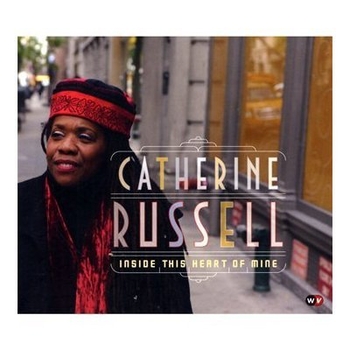
[purchase]
Catherine Russell knows her jazz history. In the booklet that comes with Inside This Heart of Mine, she identifies her source for each tune, not necessarily the original artist, but the one she first heard. Here are Fats Waller and Duke Ellington from before World War II, but here also are Maxine Sullivan and Arthur Prysock from much later. The booklet gives a year for each tune, and they range from 1929 to 2009. But, from the sound, I would say that the model for this music overall is the period when jazz was pop music, before rock n roll. In those days, jazz was music for dancing, even when there was a singer. The band had to keep a consistent beat through each tune, and the solos had to make sense to a casual listener, while also rewarding a closer listen. The singer had to deliver the words clearly, and not go off on wild scat adventures. What made a great singer was her ability to carry the emotion of each piece, and she had to go from sorrow to joy and back again from one song to the next.
These are the limits that Catherine Russell sets for herself and her band here. But she also has to know that, nowadays, people will not be dancing to this. So she must focus on the listener. The emotion is the key. And since this is an album, Russell and her band must provide enough variety to make this an interesting listen throughout. One way to do this is by varying the arrangements, and this lets Russell surprise us.
So those are the rules. And Russell and her band do a wonderful job. The rhythm is tight throughout, and the energy is high. This is true even though many of the songs do not use drums, and the personnel shift in and out. The solos always preserve the emotion of the song, while usually providing a countermelody. In the course of the album, solos are taken on trumpet, clarinet, saxophone, piano, guitar, fiddle, and even banjo. Russell has all of these musicians completely in tune with what she’s after, and they all deliver. And then there is Russell herself. She sings in a low soprano, mostly smooth with just the slightest catch. She adds or subtracts breath as needed, to go from joyful to sorrowful to sultry to humorous, and it is all completely convincing. She also works with variety of musical settings, and adapts her voice to work best with each.
The lyrics are not deep. These songs are about conveying an emotion in a very direct way. We the People is an election year, (1938), plea for good music. Quiet Whiskey, although it has a lot of words, is the story of a drunken revel, told from the point of view of a bottle of whiskey. The rest of the songs are full of sentimentality, from earnest pledges of love to the sorrow of love lost. The key is that Russell’s performance makes all of this true. She inhabits these songs, and we believe in them because she does. As Long As I Live is the most complex lyric here. The arrangement is for just piano, bass, guitar, and voice. The song presents a woman who hopes that she can love her man enough while she still lives. The threat of mortality hangs over this one, and Russell does not shy from it. Her performance here avoids the potential in the lyric for mawkishness, and makes this woman’s love noble.
Some of the arrangements took me by surprise. November is arranged for bass, violin, accordion, and voice, and neither the accordion or the violin have shown up on the album before this. The song uses the coming of the colder weather as a metaphor for the loneliness of separation, and the arrangement really works. Just Because You Can also has the violin, but here it is joined by bass and banjo. I’ve never heard jazz banjo before, except in Dixieland, but it works here kind of like Django Reinhardt’s guitar. And Howlin’ Wolf’s Spoonful is arranged here for banjo, drums and tuba. It’s an amazing sound, with all of the intensity of the original. These unusual arrangements help to keep things interesting, but the album is a coherent whole. Catherine Russell and company have succeeded in taking this music from the dance halls of yesterday and making it a rewarding musical experience for the listeners of today.
Catherine Russell: As Long as I Live
Catherine Russell: Spoonful






1 comments:
Oh, I like both of these a lot! The Spoonful arrangement is different, yeah, but her voice makes a great anchor.
Post a Comment